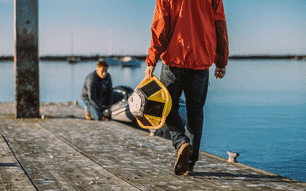Dongwon is accused of making false and fraudulent statements in order to obtain US vessel documentation and tuna fishing licenses for two Korean owned and operated vessels in the South Pacific.
“The accusations against StarKist’s owner Dongwon Industries suggest a company in dire need of reforming its business practices,” said Casson Trenor, Greenpeace Oceans Campaigner.
“Evidence has already linked Dongwon to environmental scandals and illegal fishing practices. American consumers deserve better when they buy canned tuna - and so do our oceans.”
The legal complaint states that a former Dongwon executive used his daughters’ acquired US citizenships to establish “paper companies” - companies with no operations that exist exclusively for a financial reason - in the state of Delaware under their names. Yet at all times, the “paper companies” were allegedly controlled by Dongwon Industries.
The whistleblower claims that the aim was to obtain US vessel documentation for Korean-owned tuna purse seine ships, which then allowed Dongwon to obtain fishing licenses reserved only to US registered vessels under the South Pacific Tuna Treaty. US taxpayers pay $18 million per year for these licences, which are meant to ensure the US fishing industry gets its share of the catch. Dongwon is even alleged to have created the American-sounding pseudonym “William Phil,” a fictitious person that purported to be a manager when corresponding with US government officials.
Furthermore, the lawsuit also cited Dongwon's failure to report oil discharge and dumping at sea with the intent to avoid or decrease civil penalties for such illegal acts – a possible violation of the Act to Prevent Pollution from Ships. If found guilty, Dongwon could face incidental, civil, and treble (triple) damages for each violation.
“This case again reaffirms Greenpeace’s call on the Korean government to urgently reform its fisheries regulations to combat overfishing,” said Jie-Hyun Park Greenpeace East Asia Oceans Campaigner.
In early 2013, Korea was identified by the US as an illegal, unreported and unregulated (IUU) fishing nation due to its failure to regulate the continuous IUU fishing of Korean vessels. If Korea fails to address the illegal practices of its distant water fishing industry by the end of 2014, sanctions under this listing may include a ban on the imports of certain fish or fish products into the US. The EU followed suit with the pre-identification of Korea into its list of fishing law violators.
Dongwon commands the Korean canned tuna market with a 70 per cent market share. In 2008, it entered the the US canned tuna market with the acquisition of StarKist. When combined, the two entities form the world's largest canned tuna conglomerate with yearly revenue of 1.5 trillion KRW (approximately $1.4 billion).




